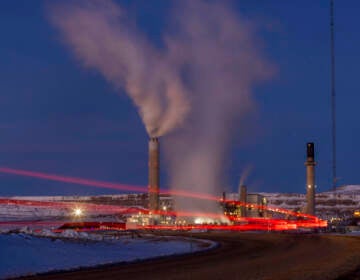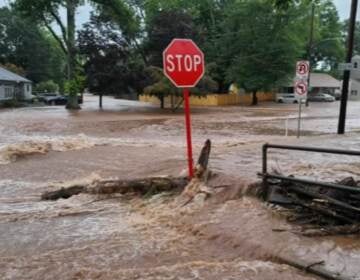Court blocks Pennsylvania’s carbon emissions plan
The court granted a preliminary injunction that prohibits the Wolf administration from “implementing, administering, or enforcing” the carbon-pricing policy.

In this March 12, 2020, file photo, the sun shines through clouds above a shale gas drilling site in St. Mary's, Pa. (AP Photo/Keith Srakocic, File)
A state court temporarily blocked Pennsylvania from participating in a regional carbon pricing program to combat climate change, ruling Friday in favor of coal-related interests that argue the administration of Gov. Tom Wolf is seeking to impose an unlawful tax.
Commonwealth Court granted a preliminary injunction that prohibits the Wolf administration from “implementing, administering, or enforcing” the carbon-pricing policy, which is meant to curb power plants’ emissions of carbon dioxide and has long been the centerpiece of the Democratic governor’s plan to fight global warming.
The Wolf administration said it will appeal to the state Supreme Court.
Wolf made Pennsylvania the first major fossil fuel state to adopt a carbon pricing policy, in which power plants fueled by coal, oil and natural gas are required to buy a credit for every ton of carbon dioxide they emit. Pennsylvania is one of the nation’s biggest polluters and power producers.
The Power Pa Jobs Alliance, a coalition of industry and labor groups, said that power plant operators would have started paying what it called the “carbon tax” on Friday had the court not issued its injunction. It contends the carbon policy will impose higher electricity costs on consumers. The group called Friday’s ruling a “significant win for working families.”
The regulation at issue committed Pennsylvania to the Regional Greenhouse Gas Initiative, a multistate consortium that sets a price and declining limits on carbon dioxide emissions from power plants run by fossil fuels. The Wolf administration estimates that the initiative will reduce Pennsylvania’s carbon dioxide emissions by up to 225 million tons through 2030.
The court’s decision is “yet another roadblock and stalling tactic from RGGI opponents,” said Jessica O’Neill, an attorney for PennFuture, an environmental group. She contended that Pennsylvania’s participation in the carbon pricing program “will unquestionably save lives by improving air quality and is necessary to cut Pennsylvania’s significant carbon footprint from the power sector.”
Commonwealth Court said the plaintiffs — power plants, labor unions and coal mine owners — had “raised a substantial legal question” about whether the program imposes an unlawful tax, since taxing power rests with the General Assembly, not the executive branch. It did not rule on the merits of the case.
Wolf has long maintained the state can regulate carbon dioxide under an existing law dealing with air pollution.
WHYY is your source for fact-based, in-depth journalism and information. As a nonprofit organization, we rely on financial support from readers like you. Please give today.







